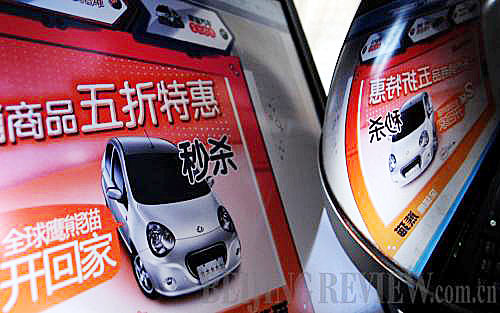|
 |
|
ACCUSED OF INFRINGING: In December 2010, Geely became the first Chinese automaker to sell cars on Taobao.com. The USTR labeled the website as a "notorious market" (HAN CHUANHAO) |
The USTR said it issued the list to assist the global fight against piracy, a growing threat to entrepreneurs and industries around the world.
But the reasoning sounds unfounded given the Yiwu Petty Commodities Market's past. In 2008, the USTR in its annual Special 301 Report described Yiwu as a market of pirated goods. In 2009, the USTR softened its tone with warnings that Yiwu still needs to make progress in terms of IPR protection and enforcement. Last year, however, the office even recognized Yiwu's improvement in IPR protection, saying that officials at Yiwu had met repeatedly with U.S. Government officials and that enforcement in Yiwu had improved according to industry insiders.
Now it seems the USTR has resumed its negative stance toward Yiwu as it blamed the city as "a major distribution center of infringed goods."
"Such fickle moves to point fingers are hard to understand," said Xie. "The USTR is using the IPR issue to damage Chinese companies."
Since the United States singled out China's search engine Baidu and the popular e-commerce platform Taobao for IPR infringement, Xie believed it was a revenge tactic for Google's expulsion from the Chinese mainland market.
The USTR claimed that Baidu offered links to infringing content hosted on third-party sites without the copyright holders' permission. These links take Web users to a specific point within a website without first going to the website's home page, it said.
Taobao has a "long way to go" to stamp out the availability of IPR goods on its website, though the company is making "significant efforts" to resolve the problem, said the USTR.
In a written statement, John Spelich, an Alibaba spokesman, said, "We appreciate the USTR's acknowledgment of our ongoing efforts to work with brand owners in protecting their IPRs and we will continue enhancing the level of trust and integrity in our online marketplaces for the benefit of all our stakeholders."
China has spared no effort to crack down on piracy conducted by Internet companies. The Ministry of Public Security in 2010 even launched a nationwide campaign to strike hard against online piracy and counterfeit products, said Xie.
In last year's campaign, six senior managers of the online video website Openv.com were sued for video piracy.
As China's e-commerce sector and online marketing have become increasingly mature, there is a growing need to further standardize and regulate the emerging industry, said Fang Xingdong, an independent Internet analyst and founder of Blogchina.com.
But the USTR's list has apparently politicized the issue of online piracy, which should have remained a market or legal problem, he said.
"The United States should have tackled the problem in an economic or legal way," said Fang. "The government-issued list disobeyed the principle of the market economy for which the United States has stood firmly for."
In addition, the listed websites' images have been stained for having only a few infringing products or information. This is unfair to other fair content and innocent sellers, he noted.
China's e-commerce market is exploding with vitality. In 2010, online shoppers topped 148 million nationwide. The transaction value skyrocketed 97.3 percent year on year to reach 513.1 billion yuan, accounting for around 3 percent of the country's total retail sales, and most of these sales are for legitimate products, not knock offs.
Analysts said there are also some pirated products on the U.S. auction and shopping site eBay.com, and the United States should not take a double standard on this issue. China's booming e-commerce industry has put pressure on its U.S. counterparts, and that is probably why the USTR tried to deal a blow to the Chinese companies, they said.
MOFCOM responds
The Ministry of Commerce (MOFCOM) will pay attention to the list's impact on Chinese businesses, said Li Chenggang, Director of the Department of Treaty and Law under the ministry, on March 14.
Li said MOFCOM officials had studied the USTR's report but found no solid facts to back up its claims.
Moreover, the USTR said, "the Notorious Markets List does not purport to reflect findings of legal violations, nor does it reflect the U.S. Government's analysis of the general climate of protection and enforcement of IPRs in the countries concerned."
"Is it appropriate to release such a list without evidence? We'll pay attention to its negative impact on the reputation of relevant and named Chinese companies," said Li.
China still has a lot to do to improve its IPR protection, although it has already made vigorous efforts, he said. In the past three decades, the country's achievements to safeguard IPRs were magnificent, said Li.
IPR protection is a needed boon for the country to build an innovative society and propel economic development. As a result, the Chinese Government will take whatever efforts necessary to make progress in this regard, he added. | 